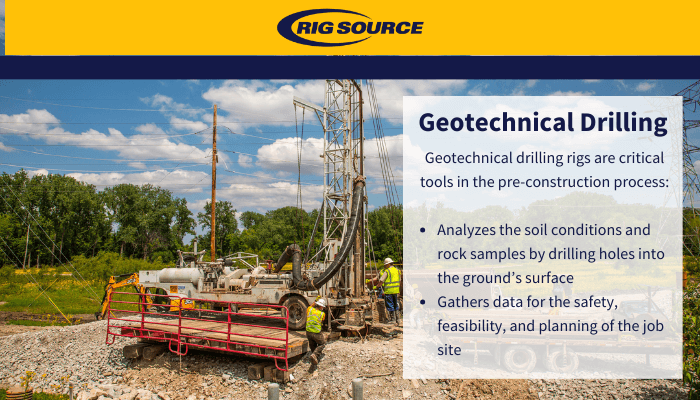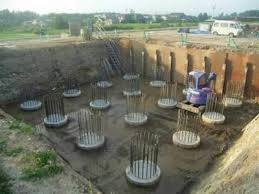Everything You Need to Find Out About Geotechnical Engineering for Your Following Project
Everything You Need to Find Out About Geotechnical Engineering for Your Following Project
Blog Article
The Importance of Geotechnical Design in Resolving Environmental Obstacles and Enhancing Construction Safety
Geotechnical design offers as a keystone in the intersection of environmental stewardship and construction safety, supplying crucial understandings right into the behavior of dirt and rock under different problems. By implementing critical website examinations and tailored mitigation measures, geotechnical designers play a vital role in securing both human lives and ecological stability.

Duty of Geotechnical Design
Geotechnical design plays a crucial role in the design and building of infrastructure by resolving the behavior of soil and rock products under different conditions. This area of design is necessary for understanding the interaction in between frameworks and the ground, that includes determining the load-bearing ability of soil, examining stability, and anticipating possible settlement or failure.
Geotechnical engineers are accountable for conducting site examinations, which include sampling and testing soil and rock to collect data on their chemical and physical properties. This info is important for making structures, maintaining walls, and other earth-retaining frameworks that ensure safety and longevity. In addition, geotechnical design educates the selection of suitable construction methods and products, thus lessening threats connected with soil habits.
Moreover, the combination of geotechnical engineering concepts into city planning and environmental monitoring is crucial for dealing with difficulties such as ground contamination and groundwater monitoring. By recognizing geotechnical factors, designers can develop lasting remedies that enhance the strength of framework versus all-natural hazards, while likewise promoting ecological stewardship. Inevitably, the function of geotechnical design is vital for accomplishing safe, durable, and ecologically mindful construction techniques.
Soil Disintegration Mitigation
Soil disintegration postures a substantial risk to both environmental security and infrastructure stability, affecting about 24 billion lots of abundant dirt lost every year worldwide. This phenomenon is exacerbated by factors such as logging, urbanization, and poor agricultural practices. Geotechnical design plays a critical function in establishing efficient soil erosion reduction approaches that secure both the atmosphere and building and construction jobs.
One technique involves the implementation of disintegration control techniques such as greenery growing, which maintains soil with origin systems. In addition, the building of keeping wall surfaces and balconies can efficiently decrease surface area drainage and protect vulnerable locations from disintegration. Appropriate drainage style is likewise vital; it reduces water buildup and routes excess runoff far from critical frameworks.
In addition, geotechnical designers use soil stablizing strategies, such as the application of geotextiles and naturally degradable mats, to enhance soil communication and protect against deterioration - geotechnical companies in south africa. Normal tracking and evaluation of erosion-prone websites make it possible for prompt treatments, ensuring lasting sustainability. By incorporating these methods, geotechnical engineering not only alleviates the effects of soil erosion yet additionally adds to the resilience of infrastructure versus ecological difficulties, eventually cultivating a much safer and a lot more sustainable developed setting
Groundwater Security Strategies
Groundwater functions as an essential source for alcohol consumption water, farming, and industrial procedures, making its defense important for environmental sustainability and public health and wellness. Reliable groundwater defense approaches are important in alleviating contamination threats and guaranteeing the long life of this source.

Routine monitoring of groundwater high quality is also essential, allowing early discovery of contamination sources and helping with timely remediation efforts. Employing innovative innovations, such as geophysical studies and remote sensing, help in determining potential hazards to groundwater reserves.
Additionally, public education and learning and stakeholder interaction are crucial, fostering community assistance for groundwater security efforts. geotechnical specialist. By integrating regulatory procedures, technical developments, and community involvement, we can create a comprehensive framework that safeguards groundwater resources while over here advertising sustainable growth and building practices
Landslide Threat Management
Landslides present substantial hazards to both human safety and security and facilities, making efficient risk management approaches necessary. Geotechnical engineering plays a vital duty in recognizing, analyzing, and mitigating landslide risks. A comprehensive understanding of incline security, dirt mechanics, and hydrology is essential for creating effective threat administration plans.
The very first step in landslide risk administration involves detailed site examinations, that include geological mapping and soil screening. These examinations help engineers review the potential for landslides by identifying essential aspects such as slope angles, soil make-up, and water web content. Using sophisticated technologies such as remote sensing and geophysical studies can boost the accuracy of these assessments.
As soon as threats are identified, proper reduction procedures can be applied. These may consist of engineering solutions such as keeping walls, water drainage systems, and incline stablizing strategies. Keeping track of systems ought to be established to find signs of ground movement and changes in water levels, permitting for aggressive treatments.

Enhancing Building Safety And Security
Construction sites frequently provide a myriad of dangers that can threaten employee safety and job integrity. Geotechnical engineering plays an important duty in boosting building safety and security by supplying essential understandings right into subsurface problems. Through extensive dirt and rock evaluation, geotechnical engineers can recognize potential risks, such as soil instability, groundwater issues, and seismic susceptabilities, which may jeopardize the security of construction activities.
Implementing geotechnical solutions, such as proper foundation layout and the usage of maintaining frameworks, minimizes these dangers substantially. These solutions not just make sure the stability of the structures being built yet likewise develop a much safer working atmosphere for building workers.
Furthermore, promoting a culture of safety and security via training and adherence to developed safety protocols even more boosts building site security. By integrating geotechnical competence right into the planning and implementation stages, building projects can accomplish higher security standards, inevitably protecting employees and making sure successful job conclusion.
Conclusion
In verdict, geotechnical design functions as an essential discipline in promoting and taking on ecological difficulties building safety and security. With reliable soil erosion mitigation, groundwater defense strategies, and landslide risk management, geotechnical engineers add to why not try these out the development of durable framework. The assimilation of these techniques promotes a safer construction setting and boosts the sustainability of civil engineering projects. Ultimately, the know-how of geotechnical Visit Website designers is important in securing both natural deposits and human lives versus possible risks.
Geotechnical engineering serves as a keystone in the junction of environmental stewardship and building safety, offering essential insights into the behavior of soil and rock under numerous problems. Geotechnical engineering informs the selection of ideal construction techniques and products, therefore lessening dangers connected with dirt habits.
Geotechnical design plays a pivotal role in creating reliable soil erosion reduction approaches that guard both the setting and construction projects.
Additionally, geotechnical designers utilize soil stabilization methods, such as the application of geotextiles and eco-friendly floor coverings, to improve soil cohesion and avoid degradation. Via extensive soil and rock analysis, geotechnical designers can determine possible threats, such as dirt instability, groundwater issues, and seismic susceptabilities, which may jeopardize the security of construction tasks.
Report this page